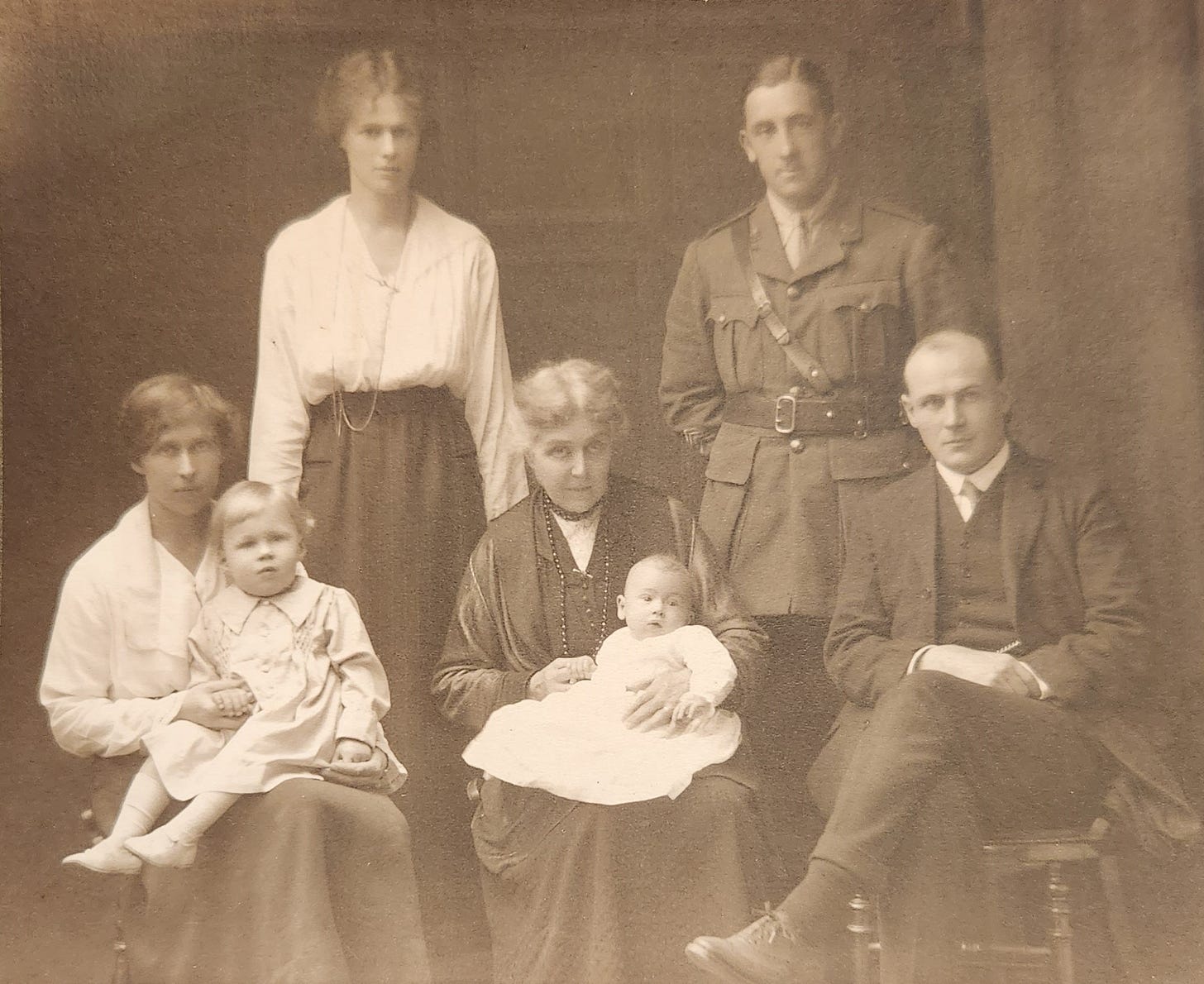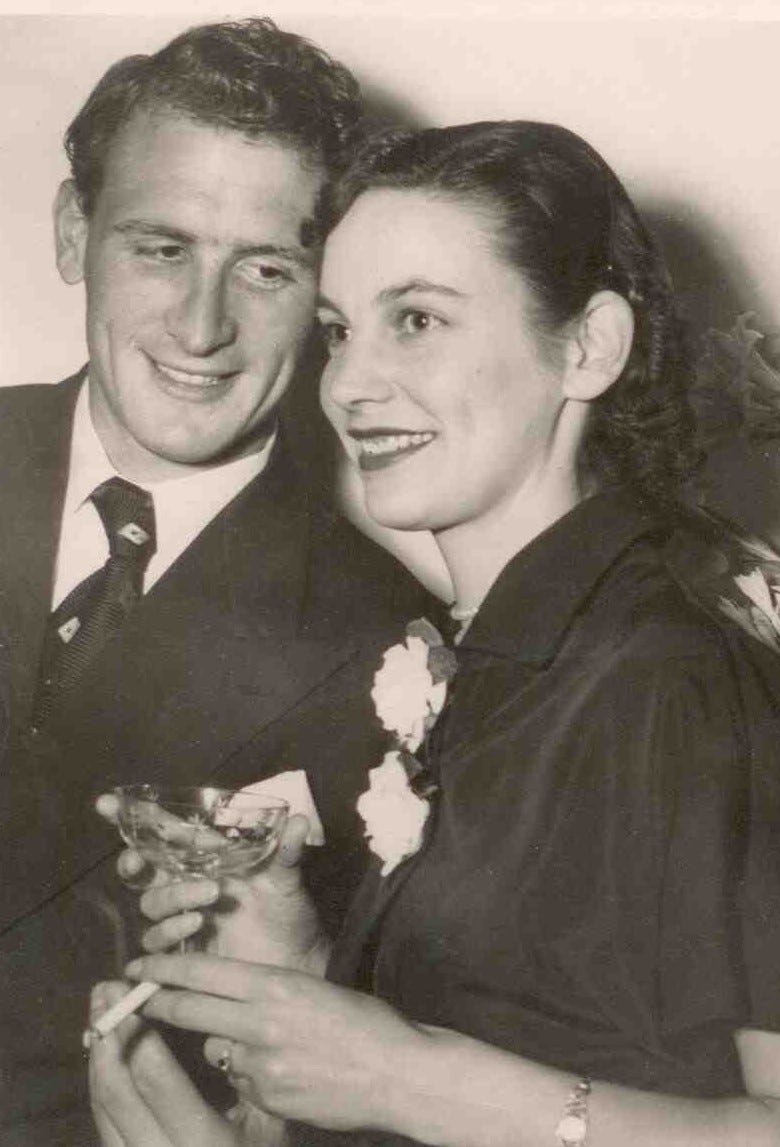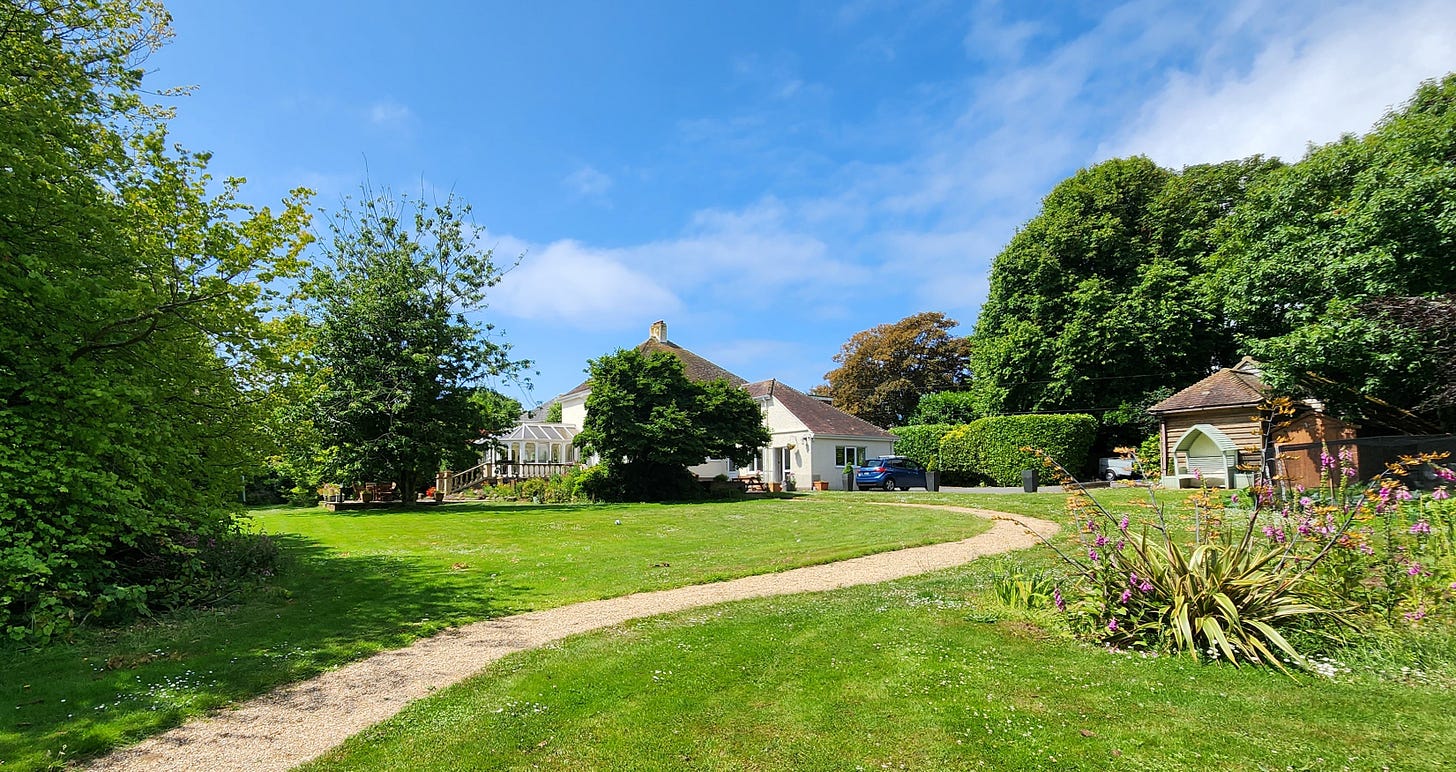You Can't Choose Your Family: Part 1
Knowing where we come from seems a fundamental step in working out who we are. I'm fortunate enough to be able to say that the more I learn, the more grateful I become.
18 June 2023
I suspect a little family history may assist at this juncture. And bear with me here, because I hope you’ll agree, once I’m through, that some elements at least of this remarkable tale are worth sharing.
My grandmother on my father’s side, Margaret Constance Pruen (known by all as Constance) grew up in Cheltenham in Gloucestershire, England. Constance met my grandfather, Edward Rae Cordner, during the First World War – when she was a British nurse, and he a Captain and medical officer in the Australian Imperial Forces fighting on the Western Front.
Prior to serving in France, Edward had endured a number of months as part of the ill-fated Allied campaign at Gallipoli. His original arrival in the Dardanelles had been delayed as a result of the fact that the ship on which he was initially travelling to Anzac Cove (as it is now known) from the Egyptian port of Alexandria was struck by a German torpedo near the island of Lemnos, in the Aegean Sea, on 2 September 1915. Remarkably, the majority of the troops on board that ship, HMT Southland - including Edward, and a member of the 21st Battalion who was then unknown to him, Alfred Effingham Reed (known as Alf: remember that name) ‑ survived the attack.
Edward and Constance married in Cheltenham in January 1918 - ie before the Great War had concluded - and their first child, my uncle Ted, was born a year later in the UK. Subsequently Edward and Constance returned to Edward’s home town of Melbourne, Australia, where Edward would resume his practice as a doctor. Over the next decade Edward and his English bride would raise Ted, and Ted’s three younger brothers – Donald (born in 1922), Denis (born in 1924), and my father, John (born on 20 March 1929).

In November 1951 Edward Cordner and Alf Reed, both then aged in their early sixties, would meet each other for the first time, and only then become aware that they had both been aboard the Southland when it received that torpedo strike back in 1915. The occasion of their meeting? A party celebrating the engagement of Edward’s youngest son, John (my father) to Alf’s eldest child, and only daughter, Gwen (my mother). Had Edward and Alf not both survived the torpedoing of the Southland (31 men did not), had they not both survived their months at Gallipoli (where over 8,000 Australian troops lost their lives), and had they not both survived their years on the Western Front (during which period 46,000 Australian soldiers died) then self-evidently you would not be reading this now. Because in those circumstances my parents could never have met, and married, and I would never have been born.

My grandmother, Constance Cordner, had just one sibling - an older brother, Arthur. During his life Arthur Pruen became a respected solicitor, before dying in 1944, at the age of 61, whilst holding the office of the Mayor of Cheltenham. Arthur fathered a total of six children - two by his first wife, Kathleen Walker, who died in 1928, and four during his subsequent marriage to Eveline Hastings. The second child of Arthur’s second marriage, Evelyn – known throughout her life as Bunty – was, like her siblings, a first cousin to my father and his three brothers. In 1959 Bunty would, at the age of 27, marry John de Putron – he being a successful businessman who hailed from a distinguished family residing on the small Channel island of Guernsey.
Although my father lived on the other side of the world from his English cousins for most of his life, he made a point of retaining close contact with them throughout. This was particularly so of Bunty and her family; with whom Dad, and his brothers, shared a strong bond. Over the years my parents, and my elder siblings, stayed in Guernsey a number of times. And as a result of those visits the hospitality they, and many other members of our extended family, received became legendary here in Australia. For a variety of reasons the pleasure of experiencing that hospitality first-hand had eluded me until Linda and I flew into the Guernsey capital of St Peter Port at the conclusion of our 2016 tour.
That said, I had met Bunty and John, and each of their three children – daughter Frances (two years my senior), and sons Peter and Tim (both born within 15 months of my own arrival) – when they travelled to Sydney, collectively and individually, during the 1980’s and 1990’s.
Which is all a long way of explaining why we are flying from Southampton to Guernsey today, and how it is that tonight, for at least the fourth night in a row, we will be sleeping in a different country than we did the night before. (I say “at least” because I’m not really sure where we spent the night of June 16, whilst we were in transit from Hong Kong to the UK: China, Uzbekistan, Russia – who knows?!)
And although the pace we are setting might seem a breakneck one that doesn’t allow for any real opportunity to smell the roses along the way, in the case of today, and tonight, and tomorrow, the outcome has well and truly justified the time and effort expended. Because today we are wrapped in the bosom of our extended Guernsey family, whose company is warm and stimulating, and whose generosity is exceptional. And tonight we will be sleeping, well-fed and more than adequately watered, in a comfortable bed in a delightful home surrounded by glorious gardens, and just a brief stroll away from some of the most spectacular coastline you will find anywhere in the world. And if all that wasn’t enough, there are hedgehogs here, and we have seen them!
There really is a sense that we are part of something very special by virtue of our ongoing relationship with our Guernsey relatives. And as my second cousin Tim said to us tonight: “How good will it be if the next generation feel compelled, in time, to pick up the baton that has been passed to us by our parents, which we now hold, and carry it forward for future generations to enjoy?” How good indeed.
Special mention must be made at this point of Tim de P’s partner, Jackie, who Linda and I have met only once before, during our whirlwind visit here seven years ago. Whether it’s diving into the icy waters of the Channel at dawn, biking around the entire island repeatedly in an otherwise all-male peloton to prepare for an upcoming cycling Tour (during which she will average over a hundred kilometres a day, so yes a capital T is most definitely warranted), or combining the shared duties of homemaker and breadwinner with apparently effortless ease, she exudes seemingly limitless energy. Which is all very well; but to be willing to expend that energy providing hospitality, sustenance, company and friendship to virtual strangers is surely a true measure of someone’s character. How do we properly thank you Jackie?
Guernsey trivia: Jackie works in the head office of Specsavers Optical Group Ltd - a business of which I’m sure you’ve heard, and which these days turns over revenue in excess of 3.5 billion pounds annually. What I didn’t know until she filled us in on the organisation’s history, but was fascinated to learn, is that Specsavers is a private company - owned by the family of its founders, Mary and Doug Perkins - which was established right here in Guernsey 40 years ago. Mary and Doug met one another whilst both training as optometrists at Cardiff University in the 1960’s, then built up, and sold, a chain of optometrists in and around Bristol in the UK during the 1970’s, before moving to Guernsey in the 1980’s, when Mary’s father retired there. The rest, of course, is history.
Doug and Mary still apparently regard themselves as ordinary folk - although Mary became a Dame Commander of the Order of the British Empire in 2007, is heavily involved in numerous charitable causes, and still regularly visits Specsavers stores in disguise, posing as a customer. Oh yes, and did I forget to mention, they are self-made billionaires! What a partnership.
Next week - Channel surfing, again




